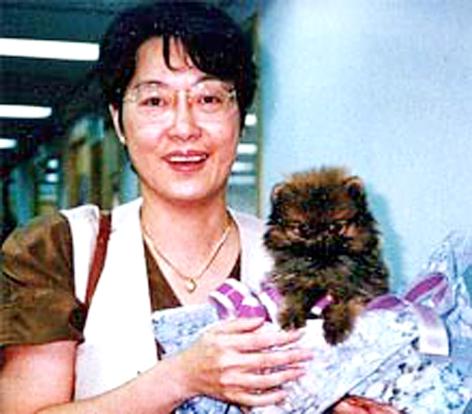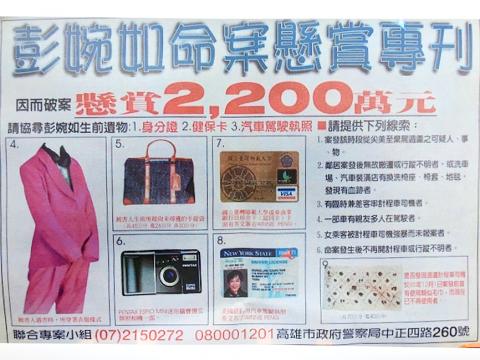There were signs of progress in the investigation into the murder of prominent women’s-rights activist Peng Wan-ru (彭婉如) 19 years ago as the Kaohsiung District Prosecutors’ Office yesterday said they are investigating a taxi driver after forensic evidence showed that he matched six fingerprint characteristics of the main suspect.
Peng, then-director of the Democratic Progressive Party’s (DPP) department of women’s affairs, was reported missing after she left Kaohsiung’s Jianmei Hotel by taxi after attending a DPP provisional national party congress on Nov. 30, 1996. Her body was found in Kaohsiung’s Niaosong District (鳥松) on Dec. 3.
While previous investigations had identified a taxi driver as a possible suspect, surveillance footage of the taxi had been blurry and the taxi’s license plate number could not be seen clearly, police said.

Photo: Screen grab from the Internet
More than 130,000 taxi drivers in the five counties and cities in the south were fingerprinted, but to no avail, the police said.
Police said that the Criminal Investigation Bureau (CIB) had recently received tips from an ex-girlfriend of a man surnamed Yang (楊), saying that Yang claimed to have killed Peng.
Yang, who turns 50 this year, had been a taxi driver in the Kaohsiung area two decades ago, but moved to the Taichung area a decade ago.

Photo: CNA
He was recently detained for driving under the influence of alcohol, police said.
CIB Director Liu Po-liang (劉柏良) yesterday said that while Yang did not match the DNA samples collected from the crime scene, he matched six characteristics of the primary suspect’s fingerprints.
Usually, cross-analysis of finger prints needs a match of at least 12 characteristics, but leeway can be allowed — 10 characteristics — if the fingerprint is unique, Liu said, adding that Yang, having matched six characteristics, required further investigation.
Accordingly, the Kaohsiung District Prosecutors’ Office said Yang has not been confirmed as the primary suspect.
New information on the case surfaces every couple of years and investigators are committed to looking into information as it arises, it said.
Meanwhile, Peng Wan-ju Foundation president Lin Shih-chia (林世嘉) yesterday said that the police’s devotion to cracking the case is to be commended and she hoped similar tragedies could be avoided.
DPP Tainan City Councilor Tang Pi-e (唐碧娥) yesterday said she only wished she had stopped Peng on that fateful day 19 years ago, as she was one of the people sending her off at the hotel as Peng got in the taxi.
Noting Peng’s day of death is coming up in 19 days, Tangsaid she hoped the culprit could be apprehended on that day.
DPP spokesperson Cheng Yun-peng (鄭運鵬) yesteday praised Peng’s contribution to women’s rights, adding that many people in the DPP has missed her a lot.
Cheng said that so far, prosecutors and the police have not confirmed the reports, however, if there are new developments, he and all the concerned friends would hope the long-time mystery could be solved as soon as possible.
Additional reporting by Loa Iok-sin and Wang Chieh

DAREDEVIL: Honnold said it had always been a dream of his to climb Taipei 101, while a Netflix producer said the skyscraper was ‘a real icon of this country’ US climber Alex Honnold yesterday took on Taiwan’s tallest building, becoming the first person to scale Taipei 101 without a rope, harness or safety net. Hundreds of spectators gathered at the base of the 101-story skyscraper to watch Honnold, 40, embark on his daredevil feat, which was also broadcast live on Netflix. Dressed in a red T-shirt and yellow custom-made climbing shoes, Honnold swiftly moved up the southeast face of the glass and steel building. At one point, he stepped onto a platform midway up to wave down at fans and onlookers who were taking photos. People watching from inside

A Vietnamese migrant worker yesterday won NT$12 million (US$379,627) on a Lunar New Year scratch card in Kaohsiung as part of Taiwan Lottery Co’s (台灣彩券) “NT$12 Million Grand Fortune” (1200萬大吉利) game. The man was the first top-prize winner of the new game launched on Jan. 6 to mark the Lunar New Year. Three Vietnamese migrant workers visited a Taiwan Lottery shop on Xinyue Street in Kaohsiung’s Gangshan District (崗山), a store representative said. The player bought multiple tickets and, after winning nothing, held the final lottery ticket in one hand and rubbed the store’s statue of the Maitreya Buddha’s belly with the other,

‘NATO-PLUS’: ‘Our strategic partners in the Indo-Pacific are facing increasing aggression by the Chinese Communist Party,’ US Representative Rob Wittman said The US House of Representatives on Monday released its version of the Consolidated Appropriations Act, which includes US$1.15 billion to support security cooperation with Taiwan. The omnibus act, covering US$1.2 trillion of spending, allocates US$1 billion for the Taiwan Security Cooperation Initiative, as well as US$150 million for the replacement of defense articles and reimbursement of defense services provided to Taiwan. The fund allocations were based on the US National Defense Authorization Act for fiscal 2026 that was passed by the US Congress last month and authorized up to US$1 billion to the US Defense Security Cooperation Agency in support of the

HIGH-TECH DEAL: Chipmakers that expand in the US would be able to import up to 2.5 times their new capacity with no extra tariffs during an approved construction period Taiwan aims to build a “democratic” high-tech supply chain with the US and form a strategic artificial intelligence (AI) partnership under the new tariffs deal it sealed with Washington last week, Taipei’s top negotiator in the talks said yesterday. US President Donald Trump has pushed Taiwan, a major producer of semiconductors which runs a large trade surplus with the US, to invest more in the US, specifically in chips that power AI. Under the terms of the long-negotiated deal, chipmakers such as Taiwan Semiconductor Manufacturing Co (TSMC, 台積電) that expand US production would incur a lower tariff on semiconductors or related manufacturing